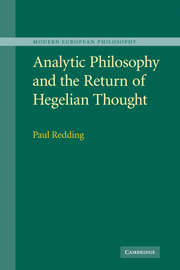Book contents
- Frontmatter
- Contents
- Acknowledgements
- Introduction: analytic philosophy and the fall and rise of the Kant–Hegel tradition
- 1 McDowell, Sellars and the myth of the perceptually given
- 2 Brandom, Sellars and the myth of the logical given
- 3 Individuation and determinate negation in Kant and Hegel
- 4 The Kantian route to Hegel's inferentialism
- 5 Aristotelian Phronesis and the perceptual discernment of value
- 6 Kant, Hegel and the dynamics of evaluative reason
- 7 Hegel and contradiction
- 8 Hegel, analytic philosophy and the question of metaphysics
- Bibliography
- Index
3 - Individuation and determinate negation in Kant and Hegel
Published online by Cambridge University Press: 22 September 2009
- Frontmatter
- Contents
- Acknowledgements
- Introduction: analytic philosophy and the fall and rise of the Kant–Hegel tradition
- 1 McDowell, Sellars and the myth of the perceptually given
- 2 Brandom, Sellars and the myth of the logical given
- 3 Individuation and determinate negation in Kant and Hegel
- 4 The Kantian route to Hegel's inferentialism
- 5 Aristotelian Phronesis and the perceptual discernment of value
- 6 Kant, Hegel and the dynamics of evaluative reason
- 7 Hegel and contradiction
- 8 Hegel, analytic philosophy and the question of metaphysics
- Bibliography
- Index
Summary
In the minds of many, Kant's comments on Aristotle's logic in the opening paragraphs to the ‘Preface to the second edition’ of the Critique of Pure Reason have been sufficient to exclude him from consideration as a serious contributor to modern logical thought. Kant's claim that logic from Aristotle's time onward had ‘been unable to take a single step forward, and therefore seems to all appearance to be finished and complete’ has been taken as indicating his unqualified commitment to syllogistic logic and his obliviousness to the coming revolution that was to unfold throughout the nineteenth century. In this sense, then, Kant is typically compared unfavourably to Leibniz, who is commonly regarded as anticipating the later growth of mathematized logic.
Recently, however, this view has started to change. Mary Tiles, for example, comments that although Kant contributed nothing towards the development of formal or symbolic techniques, he was, nevertheless, ‘the architect who provides conceptual design sketches for the new edifice that was to be built on the site once occupied by Aristotelian, syllogistic logic, but which in the eighteenth century was covered by rubble left by Ramist and Cartesian demolition gangs’, and similar revisionist readings of Kant's logic as found in works by Manley Thompson, David Bell, Béatrice Longuenesse and Robert Hanna, bring out the modern features of Kant's hitherto largely neglected logical thought.
- Type
- Chapter
- Information
- Analytic Philosophy and the Return of Hegelian Thought , pp. 85 - 114Publisher: Cambridge University PressPrint publication year: 2007



